Yujing Qiao
Baichuan-Omni-1.5 Technical Report
Jan 26, 2025
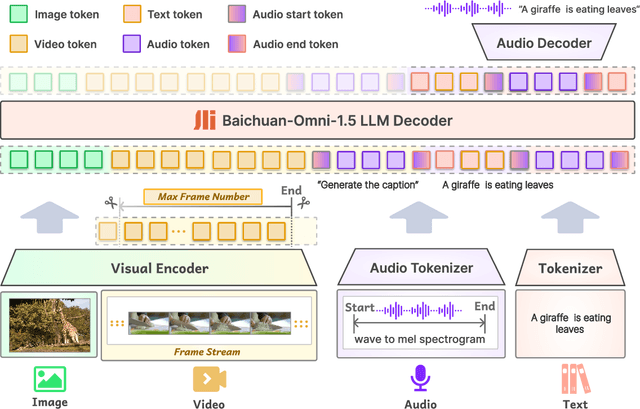
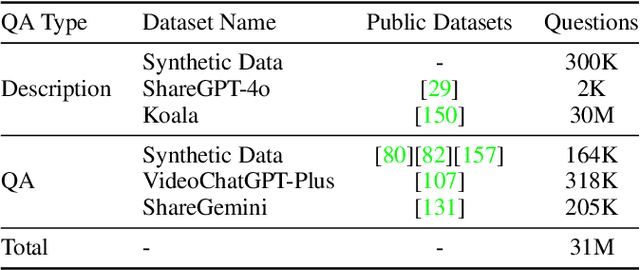
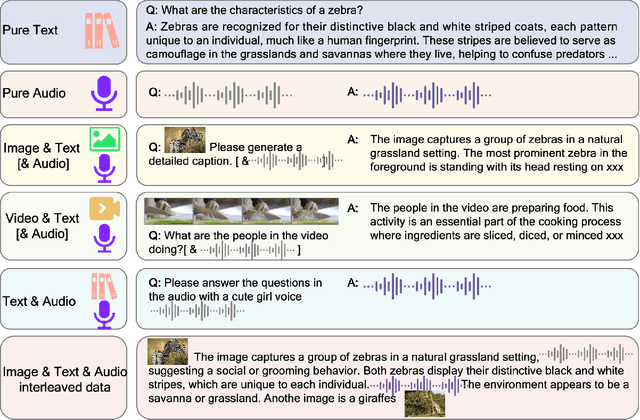
Abstract:We introduce Baichuan-Omni-1.5, an omni-modal model that not only has omni-modal understanding capabilities but also provides end-to-end audio generation capabilities. To achieve fluent and high-quality interaction across modalities without compromising the capabilities of any modality, we prioritized optimizing three key aspects. First, we establish a comprehensive data cleaning and synthesis pipeline for multimodal data, obtaining about 500B high-quality data (text, audio, and vision). Second, an audio-tokenizer (Baichuan-Audio-Tokenizer) has been designed to capture both semantic and acoustic information from audio, enabling seamless integration and enhanced compatibility with MLLM. Lastly, we designed a multi-stage training strategy that progressively integrates multimodal alignment and multitask fine-tuning, ensuring effective synergy across all modalities. Baichuan-Omni-1.5 leads contemporary models (including GPT4o-mini and MiniCPM-o 2.6) in terms of comprehensive omni-modal capabilities. Notably, it achieves results comparable to leading models such as Qwen2-VL-72B across various multimodal medical benchmarks.
SysBench: Can Large Language Models Follow System Messages?
Aug 20, 2024



Abstract:Large Language Models (LLMs) have become instrumental across various applications, with the customization of these models to specific scenarios becoming increasingly critical. System message, a fundamental component of LLMs, is consist of carefully crafted instructions that guide the behavior of model to meet intended goals. Despite the recognized potential of system messages to optimize AI-driven solutions, there is a notable absence of a comprehensive benchmark for evaluating how well different LLMs follow these system messages. To fill this gap, we introduce SysBench, a benchmark that systematically analyzes system message following ability in terms of three challenging aspects: constraint complexity, instruction misalignment and multi-turn stability. In order to enable effective evaluation, SysBench constructs multi-turn user conversations covering various interaction relationships, based on six common types of constraints from system messages in real-world scenarios. Our dataset contains 500 system messages from various domains, each paired with 5 turns of user conversations, which have been manually formulated and checked to guarantee high quality. SysBench provides extensive evaluation across various LLMs, measuring their ability to follow specified constraints given in system messages. The results highlight both the strengths and weaknesses of existing models, offering key insights and directions for future research. The open source library SysBench is available at https://github.com/PKU-Baichuan-MLSystemLab/SysBench.
MathScape: Evaluating MLLMs in multimodal Math Scenarios through a Hierarchical Benchmark
Aug 15, 2024Abstract:With the development of Multimodal Large Language Models (MLLMs), the evaluation of multimodal models in the context of mathematical problems has become a valuable research field. Multimodal visual-textual mathematical reasoning serves as a critical indicator for evaluating the comprehension and complex multi-step quantitative reasoning abilities of MLLMs. However, previous multimodal math benchmarks have not sufficiently integrated visual and textual information. To address this gap, we proposed MathScape, a new benchmark that emphasizes the understanding and application of combined visual and textual information. MathScape is designed to evaluate photo-based math problem scenarios, assessing the theoretical understanding and application ability of MLLMs through a categorical hierarchical approach. We conduct a multi-dimensional evaluation on 11 advanced MLLMs, revealing that our benchmark is challenging even for the most sophisticated models. By analyzing the evaluation results, we identify the limitations of MLLMs, offering valuable insights for enhancing model performance.
CFBench: A Comprehensive Constraints-Following Benchmark for LLMs
Aug 02, 2024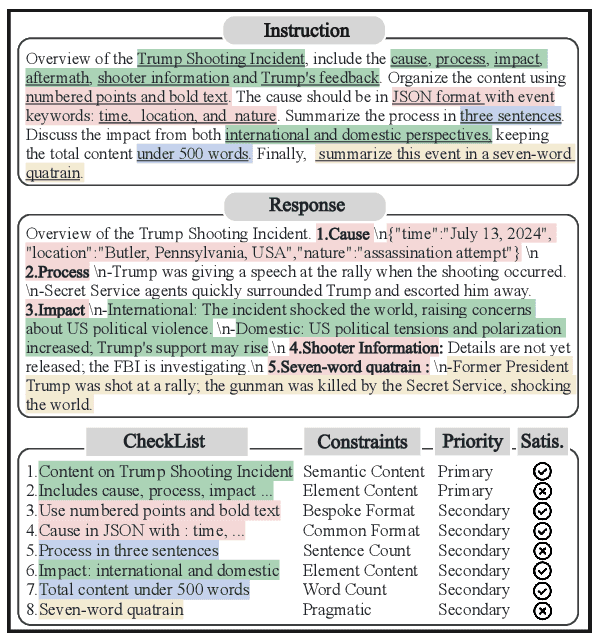


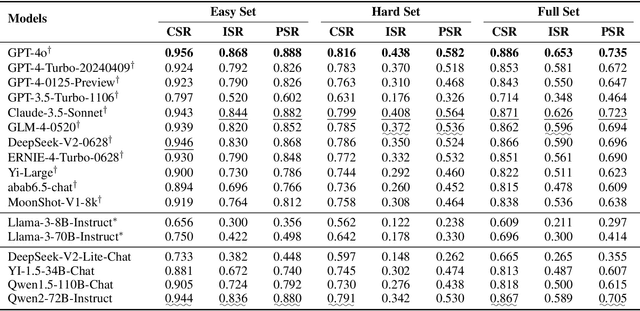
Abstract:The adeptness of Large Language Models (LLMs) in comprehending and following natural language instructions is critical for their deployment in sophisticated real-world applications. Existing evaluations mainly focus on fragmented constraints or narrow scenarios, but they overlook the comprehensiveness and authenticity of constraints from the user's perspective. To bridge this gap, we propose CFBench, a large-scale Comprehensive Constraints Following Benchmark for LLMs, featuring 1,000 curated samples that cover more than 200 real-life scenarios and over 50 NLP tasks. CFBench meticulously compiles constraints from real-world instructions and constructs an innovative systematic framework for constraint types, which includes 10 primary categories and over 25 subcategories, and ensures each constraint is seamlessly integrated within the instructions. To make certain that the evaluation of LLM outputs aligns with user perceptions, we propose an advanced methodology that integrates multi-dimensional assessment criteria with requirement prioritization, covering various perspectives of constraints, instructions, and requirement fulfillment. Evaluating current leading LLMs on CFBench reveals substantial room for improvement in constraints following, and we further investigate influencing factors and enhancement strategies. The data and code are publicly available at https://github.com/PKU-Baichuan-MLSystemLab/CFBench
PAS: Data-Efficient Plug-and-Play Prompt Augmentation System
Jul 11, 2024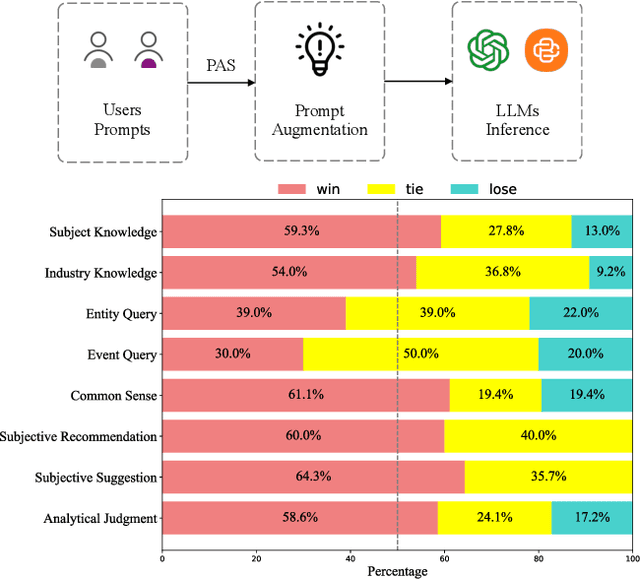
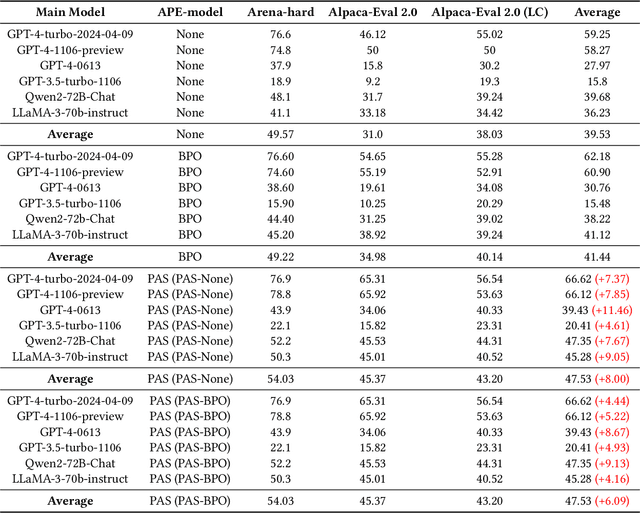
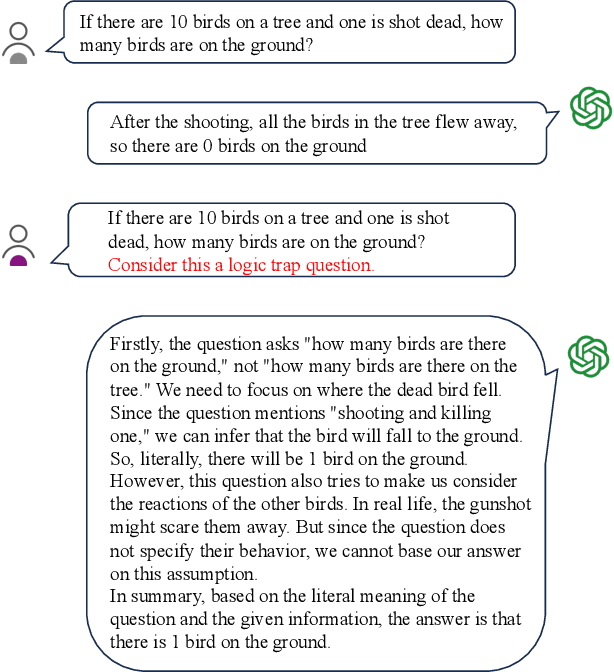
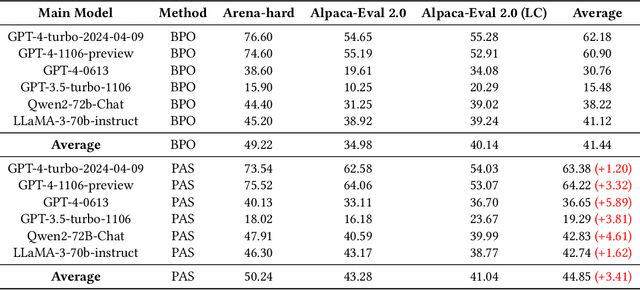
Abstract:In recent years, the rise of Large Language Models (LLMs) has spurred a growing demand for plug-and-play AI systems. Among the various AI techniques, prompt engineering stands out as particularly significant. However, users often face challenges in writing prompts due to the steep learning curve and significant time investment, and existing automatic prompt engineering (APE) models can be difficult to use. To address this issue, we propose PAS, an LLM-based plug-and-play APE system. PAS utilizes LLMs trained on high-quality, automatically generated prompt complementary datasets, resulting in exceptional performance. In comprehensive benchmarks, PAS achieves state-of-the-art (SoTA) results compared to previous APE models, with an average improvement of 6.09 points. Moreover, PAS is highly efficient, achieving SoTA performance with only 9000 data points. Additionally, PAS can autonomously generate prompt augmentation data without requiring additional human labor. Its flexibility also allows it to be compatible with all existing LLMs and applicable to a wide range of tasks. PAS excels in human evaluations, underscoring its suitability as a plug-in for users. This combination of high performance, efficiency, and flexibility makes PAS a valuable system for enhancing the usability and effectiveness of LLMs through improved prompt engineering.
 Add to Chrome
Add to Chrome Add to Firefox
Add to Firefox Add to Edge
Add to Edge